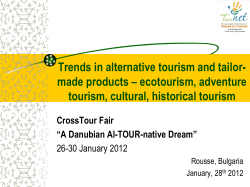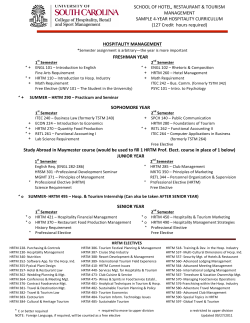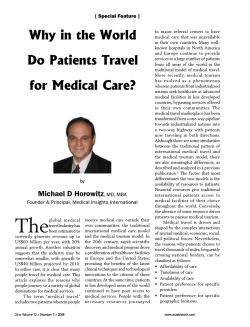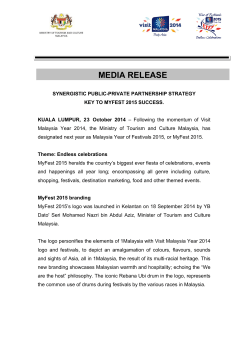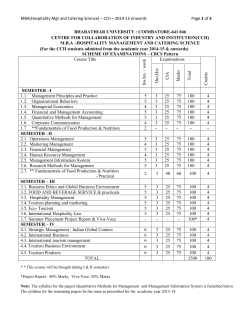
+ “The future for tourism after the crisis: does social tourism offer a
+ “The future for tourism after the crisis: does social tourism offer a route to sustainability?” Scott McCabe, Deputy Director, Christel DeHaan Tourism and Travel Research Institute, Nottingham University Business School scott.mccabe@nottingham.ac.uk http://www.nottingham.ac.uk/ttri/ + introduction What is the prospect for tourism in the short term? What is the role of tourism to individuals and society? Social tourism definitions and actions? The scope of social tourism in the UK? The benefits of social tourism to the tourism economy? Social tourism as sustainable tourism for the future ‘postmarket’ society? Tourism and public policy debates? + Economic crisis – what crisis? 2008 – international tourist arrivals 924m 2% growth for 2008 (but a -4% dip in 2009) However North and West Europe is faring much worse than other regions (489m international arrivals for 2008 represents zero growth on 2007) Clearly the business travel sector is badly hit People taking less holidays and travel trips Cutting back on volumes and spending on holidays Holidays remain an important feature of household budgets (consumers likely to trade down, not out) Cruise and all-inclusive sectors are doing reasonably well ‘Recession fatigue’ pushing holidaymakers to splash out New trends – ‘staycations’, ‘enjoy every minute’, domestic travel, home-stay holidays, new forms of sustainable and environmentally friendly alternatives – ‘glamping’ + But… Trading conditions are very tight Operators are cutting back on capacity Small operators are badly hit Firms are focusing on their segments/margins + Why is tourism important? Everyone has the right to rest and leisure, including reasonable limitation of working hours and periodic holidays with pay” (Universal Declaration of Human Rights 1948: 24) “Everyone has the right to leave any country, including his own, and to return to his country” (Art 13 (2) Universal Declaration of Human Rights 1948) + Manila declaration (1980) on world tourism: Tourism as a social policy concern “For working people they (holidays) represent an essential break, and for those who live in stressful and isolated situations through old age, ill-health or family circumstances they are recognised as having important medical and social benefits…it is a reflection of our social policy that those who are most in need of the benefits that a holiday can bring are least able to take one.” (source: ETB/TUC 1976: 5) + Policy context UK Three 'Breadline Britain' surveys that examined public attitudes to poverty and social exclusion found that a key activity which the majority of respondents (representative of the whole population) believed was that no one should be so poor as to be unable to afford a week's holiday away from home each year (Gordon et al, 2000). However, it is suggested here that the inability to participate in tourism has been neglected in UK government policies that are aimed at alleviating social exclusion and that the concept of ‘Social Tourism’ has achieved very little recognition in policy discourse in the UK (Corlyon and La Placa 2005; Hazel, 2005). Social policy and tourism? Despite central place occupied by leisure and recreation access as a social policy concern over a long time (e.g. Cahill: 1994; Clarke and Critcher: 1985; Glyptis: 1989; Gratton and Taylor: 1987) ‘Holidays’ have always occupied a ‘grey’ area in social policy texts. Always positioned as a component of leisure provision, exclusion linked to immobility (Cahill: 1994) + Holiday participation in the UK consistently only 60% of UK population takes a holiday (Roberts: 2004) In 2005-6, 3.8m children in the UK were living in income poverty – a rise of 200 000 on the previous year (DWP: 2007) In terms of material deprivation, the HBAI report utilises the FRS data (since 2004). 55% of children living in the lowest income quintile do not have access to a week’s holiday each year compared to 3% in the top quintile (DWP/HBAI report:2007: 14). The poorest 10% spend an average £2.50 per week on holidays compared with £68.70 per week by the richest 10% (Roberts, 2004a). + UK domestic trips by social group Social Economic Grouping millions) Trips (millions) Nights (millions) Spend (£ AB 42.88 126.67 8010.05 C1 40.77 124.72 6618.23 C2 21.23 69.58 3425.3 DE UKTS: 2006 final results 21.42 Source: 79.11 2911.35 + Holidays are not available to all in society – but participation may not be linked only to low incomes but other aspects of material deprivation + South West has a relatively low proportion of people in low incomes + Eurobarometer Survey on the attitudes of Europeans towards Tourism – reflects long term UK trends Overall, in 2008, two-thirds of EU citizens (67%) made a private trip where they spent at least one night away from home; 58% took a vacation, defined by a stay somewhere away from home for at least four consecutive nights for private reasons. Most citizens who did not take a holiday in 2008 said this was due a lack of the necessary funds. About 1 in 10 (11%), however, said they had serious financial problems that could impact their holiday plans. There were only six Member States where a clear majority who planned to take a holiday were confident they could afford to take a holiday in 2009: Finland (69%), the Netherlands (66%), Sweden, Luxembourg, Denmark (all 62%) and Austria (60%). while almost half (46%) of the most-educated respondents – who had made short private trips in 2008 – had made at least three such trips during 2008, only 30% of the least-educated respondents had done so. Amongst the latter, 42% had made one short trip and 24% had made two such trips (compared to 27% and 25%, respectively of the former) + Shows the effects of economic conditions on the accessibility of tourism + 16 But UK is relatively poor + Who is affected by poverty and social exclusion? social exclusion, material deprivation – social and relational aspects of poverty. Families on low incomes Families living with a disabled member Single parent families Older people Children living in low income households Socially isolated people People with reduced mobility + 27% of disabled children in the UK are living in poverty It is 3 times more expensive to bring up a child who is disabled In the UK last year there were around 4m people working on less than £7 per hour (the low pay threshold), many were part time and the proportion of women to men in the part time group was far higher Low income = In 2007/08, 13½ million people in the UK were living in households below the low-income threshold. This is around a fifth (22%) of the population. In the same period 4.0 million children were living in low income households. + Hazel (2005) suggests the following benefits for both disadvantaged and socially excluded individuals and families from holiday taking relief from stressful or mundane situations and a break from routine; mental health and well-being benefits; the encouragement of social interaction; the broadening of experience and widening of horizons; the development of independence and; the strengthening of family relationships. Benefits of participation? health benefits: extensive survey by the English Tourism council (ETC; 1999) into the health benefits of holidays which revealed that 91% of General Practitioners in the UK believe that a holiday can enhance quality of life. It also stated that 87% believed that a holiday could help alleviate behavioural problems and (childhood) stress-related illness in children. (Lewis: 2001) + What is social tourism? Hunziker (cited in Minnaert et al 2009:316), describes Social Tourism as ‘‘the relationships and phenomena in the field of tourism resulting from participation in travel by economically weak or otherwise disadvantaged elements in society’’ “all of the relationships and phenomena resulting from participation in tourism, and in particular from the participation of social strata with modest incomes. This participation is made possible, or facilitated, by measures of a well-defined social nature.” (BITS) Beset with definitional problems The term ‘social tourism’ is used mainly in France, Belgium and Italy. The adjective ‘social’ has indeed different connotations in Englishspeaking countries. There ‘social tourism’ is often associated with ‘ecotourism’ or ‘volunteer tourism’. (Diekmann et al 2009) A survey conducted among social workers in 2006 in the UK by the Family Holiday Association showed that 68% of 273 respondents had never heard the term ‘social tourism’; and a large majority was not familiar with the continental system of holiday vouchers. (FHA example used in Diekmann et al 2009) Minnaert et al (2007) argue that there is a difference between visitor and host-related definitions of social tourism encompassing a variety of different initiatives, commercial and non-commercial, governmental and private. + Key issues No general social tourism concept Numerous definitions Different social tourism systems and implementation schemes Little research.... + Social tourism research Limited Often focuses on barriers to participation and benefits to specific target groups Charity sector has limited resources to undertake detailed research Charities often serve a particular group and so research is not connected Recent renewed interest + Attempt to tackle major research categories: who does what? social (and/or health) issues and policies Supply aspects environmental and Consumer side sustainability aspects Richards 1998, 1999; HigginsDesboilles 2006 Hall & Brown, 1996;2006 Connell 2000; Hazel 2005; Long, McCabe and Scullion 207; Minnaert, Maitland and Miller 2009 Mainly social tourism organisations Ryan 2007 Smith and Hughes 1999; Hunter-Jones 2003, 2004; Shaw and Coles 2004; Lewis 2001; Minnaert, Maitland & Miller 2007; McCabe 2009 + However… Very little consideration of non-participation No knowledge of voluntary self-excluders No macro-scale analyses of datasets of participation Lack of dialogue with some key areas of social science including social policy research + Social Tourism: some relevant theoretical concepts Economy Supply and tourism employment, seasonality, economic impact of social tourism initiatives Social issues Social policy and social justice Wellbeing and quality of life Education and employment environment 27 Sustainability and seasonality + issues A need for much greater research on benefits, disparities of participation Great dialogue between tourism research and leisure, sport, recreation and the social policy academic fields Need to engage Government and local political as well as the charity/voluntary sector in making the case for ‘social tourism’ + The organization of social tourism in the UK 29 We undertook a study (June 2009): 650 organizations listed on a online charity directories 88% selected ‘Registered charity’ as the current status of their organisation and 85% indicated that they are currently providing access to short breaks/respite care/holidays for disadvantaged or sick people. Other types of organisational status were hospice (5%), local government initiatives, respite care, faith organisations and individual support groups (2% each). + How are they involved? 30 67% selected grant-giving for breaks and respite care provision as their main type of support, the remaining were subsidised or free accommodation (21%), provision of information and other services (9%) and support in completing applications to organisations which offer funding (3%). + beneficiaries +UK social tourism providers 32 Mostly small charities Main aim is to provide breaks/holidays Dealing with small numbers of beneficiaries Targeting specific groups Have funding issues + Different models of social tourism in Europe Specific Accommodation Facilities Funding for disadvantaged people Source: Diekmann et al 2008; and Diekmann and McCabe forthcoming Holiday voucher + Funding social tourism initiatives in the EU Direct State funding Working/Middle class families Unemployed families Seniors Disabled Youth Germany Germany Spain Germany Germany Poland Belgium France Public Health care Belgium Worker Unions France Belgium Romania Charities UK UK Source: Diekmann and McCabe forthcoming UK UK UK Who needs a holiday? Evaluating social tourism (McCabe 2009) Study undertaken with the ‘social tourism forum’ (3 major charities) Analysis of application forms and a follow-on survey and focus groups Aim was to develop better data collection to inform policy and to understand the benefits of financial support for holidaymaking + The needs for and benefits of a holiday We need a holiday because…? To escape difficult circumstances: practical; physical/environmental; relational/social; and health/individual. The analysis revealed how applicants felt the holiday would provide opportunities and benefits, including: to have fun; to be normal; to create memories; to have a change of scene; to relax for a change; to experience new things; as a reward for something. + Follow up survey results: opportunity for fun and happy memories for the children is most important + Focus group findings The chance to have fun/having fun together. Chance to ‘get away’. Being active and experiencing new things/places. Freedom (from chores, routines, freedom of the mind). Changed pace of life. ‘Unwind’, slow down, step back, live differently. Appreciate home more + Children’s perspectives Activities and adventures Having fun Doing new things Playing together (cousins and new friends) Policy implications in relation to current UK Government concerns on: Citizenship, Social inclusion and integration (cohesion) Health and wellbeing, Ageing, Disability and mental health poverty. Clearly an important role for holidays in policies on children and families health and well-being particularly in relation to the treatment of stress related illnesses and disorders but also in a range of other potential treatments or holistic and alternative therapies; in terms of children on Education, child growth and development, skills development social inclusion, life satisfaction. Quality of life work and return to work policies. Example: older people Age Concern identify that the benefits of holidays to older people can include: confidence building, socialising, and providing a benefit for carers (who could accompany their friends or relatives or decide to stay behind and have a break from their caring role). Ageing population exacerbates a problem for older people half of all pensioners do not meet minimum income requirements to provide for a modest, but above poverty level, lifestyle (including two 5 five day holidays in the UK [not abroad], and no private transport). This figure is likely to rise even higher in future. Age concern’s Director-General, Gordon Lishman, said: “Our pensions system simply isn’t working. Too many older people today are not reaching decent incomes in retirement and the position for future pensioners is uncertain”. (Age Concern: Modest but Adequate: 2002) National Benevolent Fund for the Aged (www.nbfa.org.uk) identify: “helping to combat the isolation and loneliness that older people feel once the front door is shut. The holiday provides an opportunity for socialising, having fun and making new friends. The change of scene is rejuvenating and boosts self confidence for people who are living on their own. The benefits of the holiday continue long after the return home with holidaymakers continuing to meet with new friends.” There are also potential health benefits: physical benefits brought about in a change to a favourable climate or more perceived health benefits brought about by a change in scenery etc. do holidays help with the grieving process? Role of Holidays in the National Dementia Strategy (2008), 570,000 UK sufferers, set to quadruple in 30 yrs time Example: young people Holidays can influence ‘life chances’ – i.e. impact upon the future development of the individual Provide opportunities for young people to learn more about themselves and develop their interpersonal skills in a fun and engaging environment out of the context of the home The YHA are long established and active providers of opportunities for disadvantaged children e.g. ‘Community Spirit’ Breaks to combat community cohesion issues (DCFS) children Children perhaps occupy a privileged position in consideration; According to a recent UNICEF report on child wellbeing, the UK ranked lowest of all the OECD countries. “The Children's Commissioner for England, Professor Sir Al Aynsley-Green, said: "We are turning out a generation of young people who are unhappy, unhealthy, engaging in risky behaviour, who have poor relationships with their family and their peers, who have low expectations and don't feel safe.“” (BBC: 24/02/07) Other groups New economic migrants/established migrant communities Ethnic minority groups Disabled people (currently 2.7m people on incapacity benefits) Particularly concerning is the rise in mental health problems in society Not simply an issue of poverty – but many disadvantaged groups have combinations which make participation more difficult: i.e. poverty + ? 50 But there are also wider implications than simply for individuals and UK society, there is the impact on the tourism industry itself and the wider EU economy/society Sustainable tourism is social tourism In promoting access for groups for which going on holiday has progressively become more difficult, social tourism strengthens the tourism industry's revenue generation potential. Social tourism aids mobility and enables off-season tourism to be developed, particularly in regions where tourism is highly seasonal. Accordingly, social tourism encourages the creation of longer-lasting employment opportunities in the tourism sector, in line with the Lisbon Strategy, by making it possible to extend such jobs beyond the respective peak season (http://ec.europa.eu/enterprise/tourism/major_activities/so cial_tourism/index_en.htm) June 2009 ANCV 2.5 million people purchase holiday vouchers A total of 7 million people accessed a holiday per year as a result of the vouchers 135,000 outlets accept the holiday vouchers Over 3 billion Euros put into French domestic tourism industry 52 IMSERSO Helps 700,000 old people access low season holidays at the Spanish seaside at a cost of EUR 75 million but results in additional government revenues of EUR 125 million 8,000 direct jobs and an estimated 45,000 indirect jobs PwC evaluation indicated that it had recognised health benefits but had not calculated savings to health service. 53 Study on the Competitiveness of the EU tourism industry – Nov 2009 Action 4.3 - Support “tourism for all” at EU level: DG Enterprise currently coordinates the Calypso action which particularly aims at elaborating a mechanism enabling particular target groups (senior citizens, young people and families facing difficult social circumstances) to go on holiday in another Member State, on the basis of themed programmes and accommodation offers recommended by public authorities (national, regional or local), possibly in the low season. The rationale behind this initiative is to enhance employment, reduce seasonality in tourist demand and improve regional and local economies. Calypso: prepatory actions and outcomes generate economic activity and growth across Europe (by facilitating the development of European tourism programmes for target groups). improve tourism seasonality patterns across Europe, particularly through the social policy function of tourism (tourism growth patterns; encouraging economic activity by target groups during the low season as a means to reduce unemployment risks for tourism personnel; mitigating pressures on the physical infrastructure of developed destinations by promoting tourism outside the peak months; assist in the development of small emerging destinations in the context of regional development). create more and better jobs in the tourism sector (respect for tourism sustainability challenges; strengthening full-time employment prospects as opposed to seasonal parttime work; improving employment conditions by stressing the importance of a qualitative work environment throughout the entire tourism supply chain). increase the European citizenship (providing tangible opportunities to improve mobility, self-fulfilment, socialising and active learning for families, youths and seniors). (http://ec.europa.eu/enterprise/sectors/tourism/social-tourism/calypso/index_en.htm) Discussion issues Role of tourism participation in contemporary consumer society? Contribution of tourism to achieve personal and social development? Need for much greater research on social tourism? Government role to provide stimulus to tourism industry? Many thanks! Any discussion questions
© Copyright 2025

